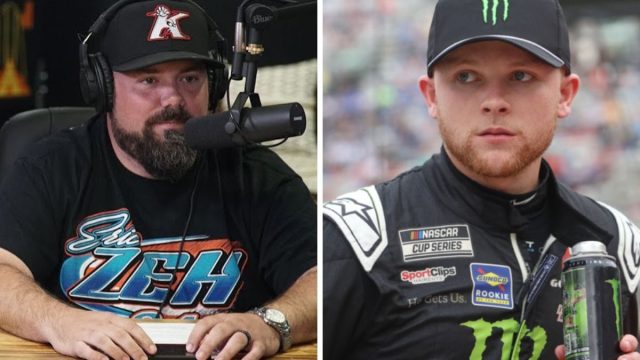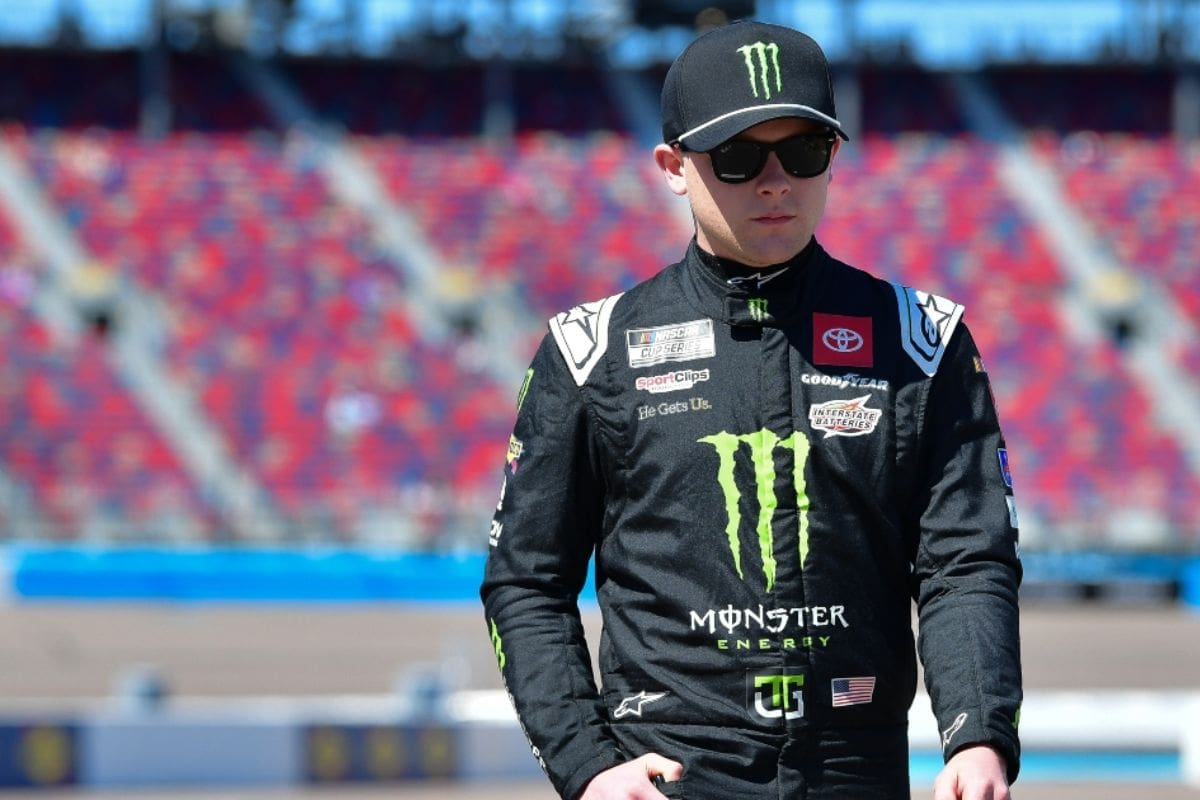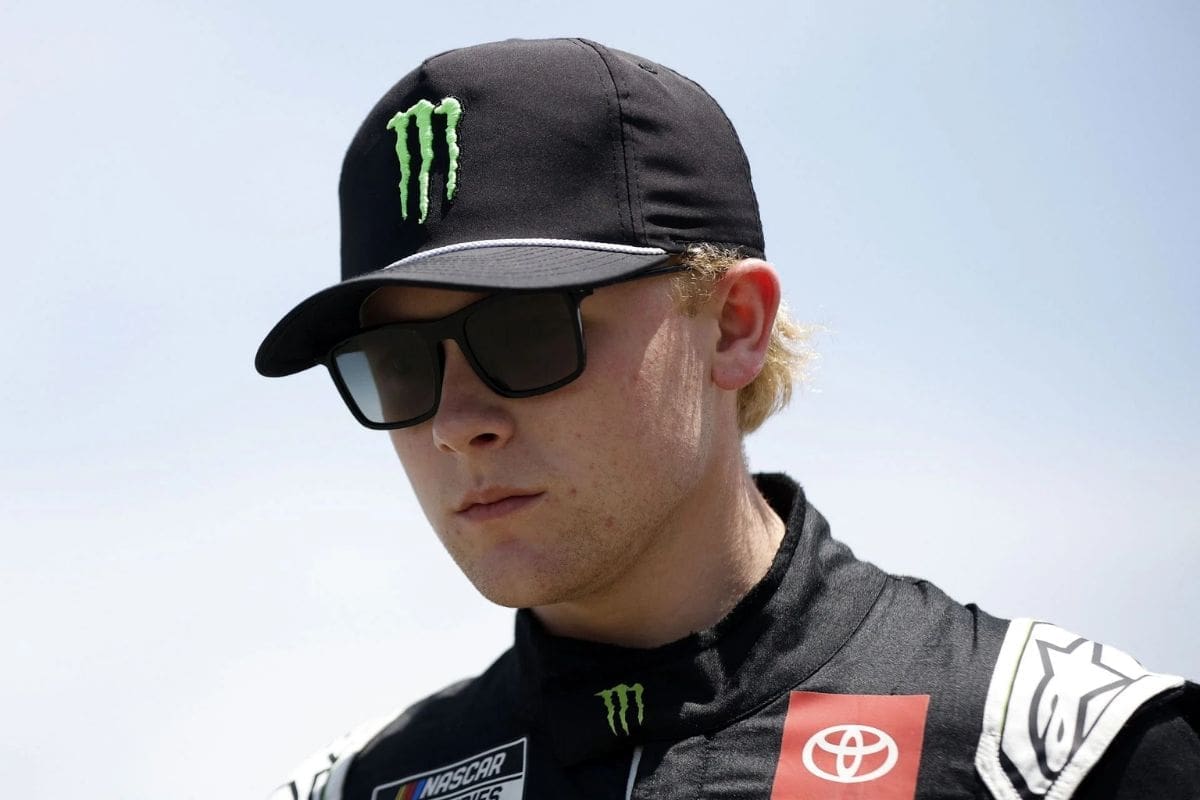Freddie Kraft Criticizes Ty Gibbs: Freddie Kraft’s recent critique of Ty Gibbs’ outburst at Sonoma has opened a compelling dialogue regarding the role of emotional intelligence in motorsports. Kraft’s pointed remarks about Gibbs’ ‘temper tantrum’ not only cast a spotlight on the young driver’s impulsive reactions but also raise questions about the broader implications for his career trajectory. This incident, set against Gibbs’ history of heated moments on the track, suggests a recurring pattern that could hinder his professional growth. As the motorsports community responds to Kraft’s comments, the focus now shifts to how Gibbs will address these concerns and adapt his behavior moving forward.
Key Highlights
- Freddie Kraft described Ty Gibbs’ actions at Sonoma as a ‘temper tantrum,’ emphasizing the negative impact on his professional development.
- Ty Gibbs was involved in a significant 14-car pileup at Sonoma due to contact initiated by other drivers.
- Kraft criticized Gibbs for his impulsivity and lack of emotional control during high-pressure situations.
- The critique highlighted the importance of reputation management and professional growth for Gibbs in NASCAR.
- Ty Gibbs acknowledged his mistakes and expressed a need for adjustments to handle stress and competition better.
Ty Gibbs’ Strong Start and Dramatic Finish
Ty Gibbs’ performance at the Xfinity race in Sonoma represented a tale of two halves, starting with a dominant display that quickly unraveled into chaos and frustration by the final stage. Initially, Gibbs demonstrated exceptional skill and strategic insight, leading multiple laps and showcasing his talent by overtaking Supercars champion Shane van Gisbergen to secure Stage 2. This early success highlighted his potential to be a formidable contender in the race, emphasizing his tactical understanding and driving abilities.
However, the race’s dynamics shifted dramatically in the final stage. A critical moment occurred when a botched pit stop relegated Gibbs to the mid-pack, an inherently risky position laden with risks and unpredictable variables. Here, the race’s intensity heightened, and the stakes became noticeably higher. The crucial moment occurred when Jeb Burton’s contact with Chandler Smith instigated a massive 14-car pileup, throwing the race into disarray.
In the chaos, Gibbs’ frustration visibly peaked. His response, characterized by impulsive actions and notably performing donuts on the track, aggravated the situation. This impulsive reaction not only inflicted severe damage on his vehicle but also detrimentally impacted his teammate Chandler Smith’s car. Despite these setbacks, Smith demonstrated resilience and skill, managing to secure a commendable seventh-place finish.
In stark contrast, Gibbs’ actions resulted in a disastrous outcome, relegating him to a 35th-place finish. The difference between Gibbs’ strong start and the dramatic, tumultuous finish highlights the volatile nature of high-stakes racing and the critical importance of composure and strategic decision-making under challenging circumstances.
Reaction from NASCAR Insiders
Analyzing the incident at Sonoma, NASCAR insiders such as Freddie Kraft and Brett Griffin provided critical insights into Ty Gibbs’ impulsive actions and their broader implications for his racing career. Kraft, who serves as Bubba Wallace’s spotter and is a co-host on the Door Bumper Clear podcast, described Gibbs’ behavior as a ‘temper tantrum’ and highlighted the consequential nature of his frustration. Brett Griffin, another respected voice in NASCAR, echoed these sentiments, emphasizing that Gibbs’ lack of composure could hinder his professional development.
“It was interesting to say the least. Ty was in position to win the race. When I went back and watched the replay… Ty was just… obviously he’s frustrated, and we’ve seen this before with Ty. It looked like a little temper tantrum.” – (Kraft)
- Impulsivity on the Track: Both Kraft and Griffin noted that Gibbs’ reaction was indicative of his tendency to let emotions dictate his actions during high-pressure situations. This impulsivity, while understandable in a competitive environment, can lead to costly mistakes and diminish his reputation among peers and fans.
- Impact on Professional Growth: Griffin pointed out that consistent outbursts could potentially alienate team members and sponsors, who prioritize a driver’s ability to remain calm and strategic. An inability to manage emotions effectively might impede Gibbs’ advancement within the highly competitive NASCAR hierarchy.
- Reputation Management: Kraft remarked on the broader implications for Gibbs’ image. Incidents like the one at Sonoma reinforce a narrative of immaturity, which could be harmful in a sport where public perception and media portrayal play a significant role in a driver’s career trajectory.
Ty Gibbs wins Stage 2 of the #ZipBuyNowPayLater250 at @RaceSonoma!
📺: FS1 | 📲: https://t.co/qkbTgR6mnc pic.twitter.com/2hu3nib3Pn
— NASCAR Xfinity (@NASCAR_Xfinity) June 9, 2024
Ty Gibbs’ History of Heated Moments
Not infrequently, Gibbs has found himself at the center of controversy due to his volatile reactions during races. Ty Gibbs, the grandson of Joe Gibbs, has garnered a reputation not just for his racing talent but also for his temperament issues, which have often overshadowed his on-track achievements.
One of the most notable incidents occurred at Martinsville Speedway in 2022. In this event, Gibbs controversially spun out his teammate, Brandon Jones, who was leading the race. This mistake cost Jones the win and led to a lot of criticism from fans and other racers. Jones needed the win to qualify for the Xfinity Series championship. This situation made people question Gibbs’ sportsmanship and ability to stay calm under pressure.
Another significant incident that highlighted Ty Gibbs’ heated temperament involved Sam Mayer, also at Martinsville. After losing out on a $100,000 Dash4Cash race bonus due to Mayer’s aggressive driving, Gibbs retaliated by running into Mayer’s car on pit road. This act of retaliation did not go unnoticed, resulting in a $15,000 fine for Gibbs. The incident highlighted not just Gibbs’ inability to manage his frustrations but also his willingness to engage in actions that jeopardize safety on the track.
Ty Gibbs’ Post-Race Reflection and Apology
In the wake of the Sonoma 250, Ty Gibbs acknowledged his own mistakes and expressed a need for adjustments in his post-race interview. Gibbs openly admitted,
“I think we need to make some adjustments to be a little bit tighter in the sweeping sections, but I just made a mistake and took us out of this day. There are some spots where the wall kicks out just because it’s not perfectly round with the way the temporary walls are. I just made a mistake and hit them.”
This statement reflects a recognition of technical and strategic areas requiring improvement, as well as personal accountability for the incident. Gibbs identified the need for the car to handle better in the sweeping sections of the track, suggesting that the setup was not ideal for this particular race configuration. This technical insight indicates an awareness of the car’s performance limitations and a commitment to refining these aspects in future races.
By admitting, ‘I just made a mistake and hit them,’ Gibbs took ownership of the error that led to his collision with the temporary walls. This level of accountability is pivotal for professional growth and demonstrates a willingness to learn from his actions. Gibbs mentioned the unique challenges posed by the temporary walls at Sonoma, noting that the walls are not perfectly aligned, which can catch drivers off guard. This observation highlights the importance of adaptability and heightened awareness on tracks with unconventional features.
Speculation on Ty Gibbs’ Future Behavior
The critical question moving forward is whether Ty Gibbs can harness his evident talent and develop the discipline necessary to avoid future impulsive outbursts on the track. Gibbs’ undeniable talent places him among the most promising young drivers in NASCAR. However, his recent display of frustration at Sonoma, which Freddie Kraft termed a ‘temper tantrum,’ raises concerns about his ability to manage emotions under stress.
Channeling his competitive spirit constructively will be vital for Gibbs. Emotional intelligence, defined as the ability to recognize and manage one’s emotions, is a key attribute for success in any high-stakes environment, including professional racing. Gibbs’ ability to learn from his past experiences, particularly the incident at Sonoma, will play a significant role in his development as a mature and composed competitor. One potential influence on Gibbs’ future behavior is the guidance he receives from his grandfather, Joe Gibbs, a respected figure in motorsports.
Joe Gibbs’ wealth of experience and mentorship could be instrumental in helping Ty develop a more measured approach to racing. Regular debriefing sessions and mental conditioning could further aid in mitigating impulsive tendencies. Moreover, Gibbs must recognize the impact of his actions not only on his career but also on his team and sponsors. Maintaining professionalism and composure is vital for building and sustaining relationships with stakeholders.
News in Brief: Freddie Kraft Criticizes Ty Gibbs
The critique of Ty Gibbs’ behavior at Sonoma by Freddie Kraft highlights the critical importance of emotional regulation in professional racing. Gibbs’ impulsive actions not only impact his immediate performance but also have long-term implications for his career trajectory.
Analyzing Gibbs’ history of emotional outbursts reveals a recurring pattern that calls for intervention. Effective emotional management will be crucial for Gibbs to achieve sustained success and maintain a positive reputation within motorsports.
ALSO READ: Joe Gibbs Steps Back as Owner to Praise Grandson Ty Gibbs



